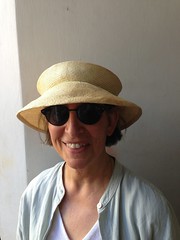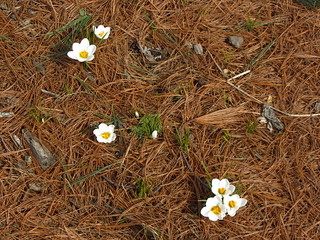
I'm a writer, publishing both as SJ Rozan and, with Carlos Dews, as Sam Cabot. (I'm Sam, he's Cabot.) Here you can find links to my almost-daily blog posts, including the Saturday haiku I've been doing for years. BUT the blog itself has moved to my website. If you go on over there you can subscribe and you'll never miss a post. (Miss a post! A scary thought!) Also, I'll be teaching a writing workshop in Italy this summer -- come join us!
Read/Post Comments (5)

Unalaska
Now, you might be forgiven for thinking this subject line refers to the opposite of Alaska. But no. It's two islands and a port, population just above 4,000, on the Aleutian chain in the Bering Sea. For you Discovery Channel fans, it's where they film The Deadliest Catch. I was out there for four days two weeks ago, teaching school.
Bouchercon in Anchorage had gotten a grant whereby any author who wanted to go would be matched up with a bush community that wanted an author. (The bush in Alaska is defined as a place you can't drive to, accessible only by boat, plane or train.) The point was to show school kids what a real writer looks like, to give them a visitor from what Alaskans call Outside; and equally, to give the writers a sense of what Alaska's like beyond Anchorage.
So I went to the Aleutians. And what an amazing place Unalaska is! Geographically: powerful winds, rain every day (sometimes with intervals of bright clear sun, sometimes not), soft hills, tundra and no trees. Lots of birds, which was why I asked to be sent there. But the most astounding thing about Unalaska is its demographics. It's an extremely prosperous, totally blue-collar place. Crabbing and fishing are its industries, and they do well. Work on the boats is hard but jobs are plentiful, and crew members are paid according to their seniority on the crew. The result of all this is that immigrants flock there. The men, and a very few women, work on the boats; the women, and some men, work in the supermarket, the four restaurants, the hotel, the car-rental place, the gas station. I taught eleven classes in two and a half days. My students were white, black, and Aleut; and Filipino, Mexican, Vietnamese, Japanese... The huge majority of the population is transient, but it's a slow, long-term transience, something I've never seen. Because of the seniority set-up, it pays to stay, and to stay with the same boat. So people settle in for four, six, ten years. The kids grow up there. But someone's always had it, pulling up stakes; and someone new is always coming. There are, of course, families that have been on the island for a two or three generations, but very few. No one plans to stay forever, so no one puts their full weight down. But on the other hand, it's an island, and it's way up north, meaning that, though it doesn't snow all that much because it's surrounded by the sea, winter days are short and those 4,000 people have only each other. So everyone's busy all the time. Community choruses and choirs, community theater, reading groups, sewing and knitting circles, church groups. Though they have the domestic crimes and alcoholism typical of small isolated communites, they have them in smaller measure. This is probably because everyone's making money, and no one's desperate: pretty much everyone's planning to leave eventually, for home, or for someplace else to settle once they've gotten some money together.
I had a great time there. I loved the kids I taught. They were open and interested, even though some of them were teenagers so you had to read between the lines to find that out. But they were great, and the work they did with me was terrific. I left them with follow-up work to do and I bet it came out well. The teachers and librarians were fabulous, all dedicated, hard-working, and pretty funny, too. I saw some new birds for me: harlequin ducks, red-faced cormorants; and a whole family of sea lions swimming by, seven or eight of them. Did not see a whale, which preserved my perfect Alaska record: four trips, no whales. I don't know if I could spend a year out there, even knowing it was only a year; but it was sure a great visit, and I'd go back in a minute.
Bouchercon in Anchorage had gotten a grant whereby any author who wanted to go would be matched up with a bush community that wanted an author. (The bush in Alaska is defined as a place you can't drive to, accessible only by boat, plane or train.) The point was to show school kids what a real writer looks like, to give them a visitor from what Alaskans call Outside; and equally, to give the writers a sense of what Alaska's like beyond Anchorage.
So I went to the Aleutians. And what an amazing place Unalaska is! Geographically: powerful winds, rain every day (sometimes with intervals of bright clear sun, sometimes not), soft hills, tundra and no trees. Lots of birds, which was why I asked to be sent there. But the most astounding thing about Unalaska is its demographics. It's an extremely prosperous, totally blue-collar place. Crabbing and fishing are its industries, and they do well. Work on the boats is hard but jobs are plentiful, and crew members are paid according to their seniority on the crew. The result of all this is that immigrants flock there. The men, and a very few women, work on the boats; the women, and some men, work in the supermarket, the four restaurants, the hotel, the car-rental place, the gas station. I taught eleven classes in two and a half days. My students were white, black, and Aleut; and Filipino, Mexican, Vietnamese, Japanese... The huge majority of the population is transient, but it's a slow, long-term transience, something I've never seen. Because of the seniority set-up, it pays to stay, and to stay with the same boat. So people settle in for four, six, ten years. The kids grow up there. But someone's always had it, pulling up stakes; and someone new is always coming. There are, of course, families that have been on the island for a two or three generations, but very few. No one plans to stay forever, so no one puts their full weight down. But on the other hand, it's an island, and it's way up north, meaning that, though it doesn't snow all that much because it's surrounded by the sea, winter days are short and those 4,000 people have only each other. So everyone's busy all the time. Community choruses and choirs, community theater, reading groups, sewing and knitting circles, church groups. Though they have the domestic crimes and alcoholism typical of small isolated communites, they have them in smaller measure. This is probably because everyone's making money, and no one's desperate: pretty much everyone's planning to leave eventually, for home, or for someplace else to settle once they've gotten some money together.
I had a great time there. I loved the kids I taught. They were open and interested, even though some of them were teenagers so you had to read between the lines to find that out. But they were great, and the work they did with me was terrific. I left them with follow-up work to do and I bet it came out well. The teachers and librarians were fabulous, all dedicated, hard-working, and pretty funny, too. I saw some new birds for me: harlequin ducks, red-faced cormorants; and a whole family of sea lions swimming by, seven or eight of them. Did not see a whale, which preserved my perfect Alaska record: four trips, no whales. I don't know if I could spend a year out there, even knowing it was only a year; but it was sure a great visit, and I'd go back in a minute.
Read/Post Comments (5)
Previous Entry :: Next Entry
Back to Top